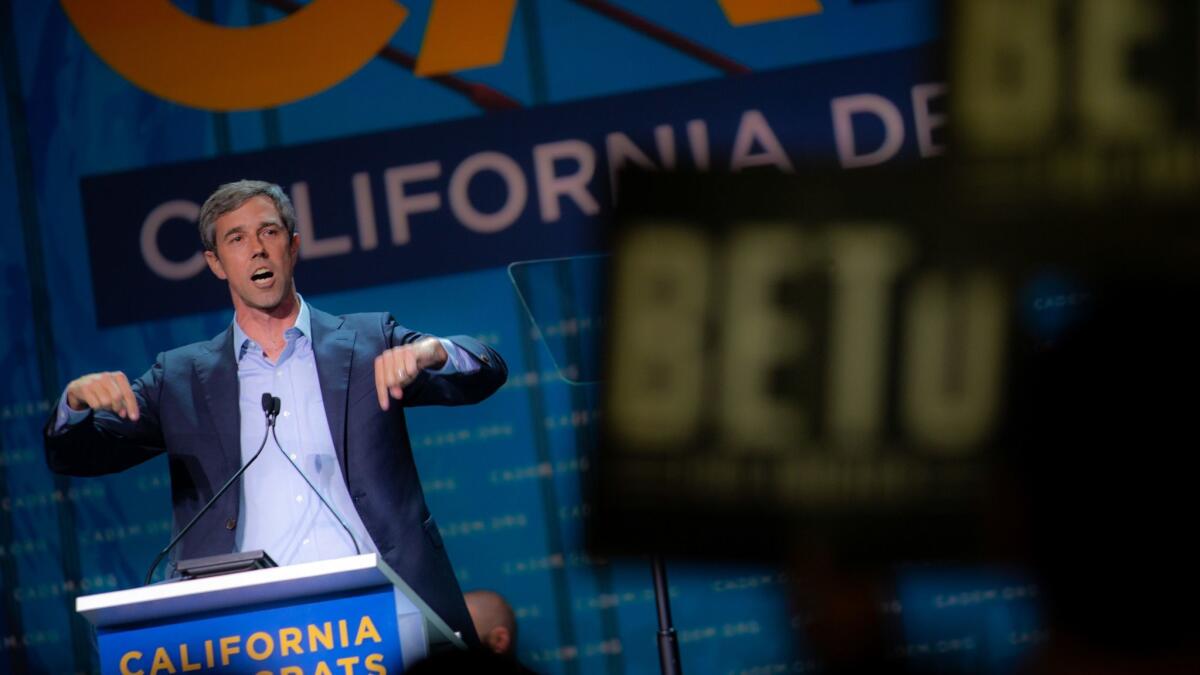Column: There’s some mystery to how presidential hopefuls get on California’s primary ballot

- Share via
In election campaigns ranging from city council to governor, there are detailed procedures for which candidates will appear on California’s ballot. And yet no similar standards are used in the state’s primary for U.S. president — where, for decades, voters have seen only a list of names drafted by a single statewide official.
The roster of would-be presidents comes from California’s secretary of state. And the criteria used are pretty much whatever the secretary wants them to be.
“It is almost subjective at this point,” state Sen. Tom Umberg (D-Santa Ana) said during a legislative hearing in April.
Umberg has a plan to change the system, Senate Bill 505, backed by Secretary of State Alex Padilla. His goal is to have it become law before the March 3, 2020, presidential primary.
The current pick-who-you-want system replaced the old rules under which presidential primary voters really chose a slate of delegates to a party’s convention, not so much a specific candidate. Political power brokers, most notably governors, would sometimes put their name on the ballot to win delegates they could then hand over during brokered convention deals.
Frustration with that process boiled over in 1968, when neither of the two major parties’ eventual nominees was on the California ballot. Democrat Hubert Humphrey, who as vice president joined the race only after then-President Lyndon B. Johnson declined to run, missed the deadline. Richard Nixon, on the other hand, opted not to compete with then-Gov. Ronald Reagan’s largely symbolic candidacy, even though polls showed Nixon was the favorite among the state’s GOP electorate.
California lawmakers again protect the loophole of unlimited political cash »
In 1972, California voters abolished that system and instead gave power to the secretary of state — as chief elections officer — to pick who he or she believed were the “recognized candidates throughout the nation,” while preserving a less-used option of gathering signatures. Letting the secretary choose candidates has sometimes led to confusion, even controversy. In 1992, comedian Pat Paulsen went to court (and lost) because Secretary of State March Fong Eu declined to add him to the state’s GOP presidential ballot.
It’s also led to very long ballots, especially as minor parties have insisted they had a lot of “generally recognizable” candidates. In some years, names that had been added had to be removed — the law allows someone to decline the invitation — which added a layer of confusion about who should really be on the ballot.
The pending state Capitol proposal, SB 505, would establish specific criteria for a candidate’s inclusion in California’s presidential primary — such as participation in a political party’s debate or qualifying for matching federal campaign funds. Recent amendments seem designed to allay fears of minor political parties, some of which opposed the bill earlier this spring.
But might strengthening the power of the political parties stifle the chances of an insurgent candidate? That’s the fear expressed by former Massachusetts Gov. William Weld, who has said he will challenge President Trump for the GOP nomination. Weld, in a detailed letter to state senators in March, said he thinks the enactment of SB 505 and its party-focused criteria could help Trump and Republican leaders keep him off California’s primary ballot.
“For the good not only of the Republican Party, but our democratic republic itself, I urge you to vote against this well-intended but flawed legislation,” Weld wrote.
Subscribe to the Los Angeles Times 2020 election calendar feed »
Supporters of SB 505, though, say the current system simply isn’t predictable or transparent. And if California wants the nation to take its presidential primary seriously, goes their argument, the state needs an equally serious system for establishing who’s a legitimate contender for the highest office in the nation.
Follow @johnmyers on Twitter and sign up for our daily Essential Politics newsletter
More to Read
Get the L.A. Times Politics newsletter
Deeply reported insights into legislation, politics and policy from Sacramento, Washington and beyond. In your inbox three times per week.
You may occasionally receive promotional content from the Los Angeles Times.











